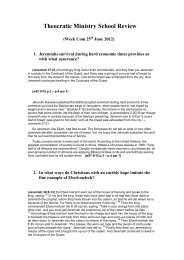1964 Awake! - Theocratic Collector.com
1964 Awake! - Theocratic Collector.com
1964 Awake! - Theocratic Collector.com
Create successful ePaper yourself
Turn your PDF publications into a flip-book with our unique Google optimized e-Paper software.
all. He stole $15,000 worth of brass in<br />
this manner every year for five years.<br />
When large items are stolen, several employees<br />
in different departments usually<br />
work together. It is estimated that 5() per ..<br />
cent of employee crimes involve collusions.<br />
Why They Steal<br />
Most thieving employees rationaliZe<br />
their actions so they do not regard themselves<br />
as criminals. When an employee first<br />
embezzles money from his employer, he<br />
tells himself that he is not stealing but only<br />
borrowing the money. In due time, he tells<br />
himself, he will repay the money. Usually<br />
the money is never repaid. In one case a<br />
bank teller "borrowed money" from the<br />
bank to gamble in the hope of getting what<br />
he felt he needed to meet his living expenses.<br />
Gambling losses soon had him owing<br />
the bank $30,000. He became frightened<br />
and fled, but was soon arrested.<br />
In some instances the trusted employee<br />
continues this "borrowing" for a number<br />
of years. A woman in a building and loan<br />
association who was highly respected in<br />
her <strong>com</strong>munity did this for twenty-three<br />
years. The amount she embezzled reached<br />
the astounding figure of nearly $3,000,-<br />
000. This was a serious economic shock to<br />
her <strong>com</strong>munity. She injured herself, her<br />
employer and her friends who had their<br />
money in the association.<br />
A <strong>com</strong>mon rationalization by thieving<br />
employees is that the firm "owes it to me."<br />
An employee might feel that he is worth<br />
more than he is being paid, so he salves<br />
his conscience by telling himself that what<br />
he steals is due him. Stin other employees<br />
rationalize by saying, "Everybody else is<br />
doing it." So they think it is all right for<br />
them to steal from the <strong>com</strong>pany. This is<br />
certain to be their thinking when they see<br />
their superior helping himself to <strong>com</strong>pany<br />
property. In one instance the manager of<br />
a department store used <strong>com</strong>pany paint<br />
18<br />
and its maintenance men to redo the in.<br />
terior of his home. Seeing this, the employees<br />
began helping themselves to merchandise.<br />
In a few years their thefts grew<br />
to the point where, in one year, the store<br />
lost $200,000 worth of goods.<br />
Gambling and extravagant living stan·<br />
dards appear to be principal factors con·<br />
tributing to employee dishonesty. Some<br />
<strong>com</strong>panies blame gambling for 75 percent<br />
of their losses from employee dishonesty.<br />
An otherwise honest employee is pushed<br />
by gambling debts to the point where he<br />
feels forced to steal. Another employee<br />
who has "borrowed money" from his <strong>com</strong>.<br />
pany resorts to gambling to replace what<br />
he took, but his losses mount, and he takes<br />
still more money. Taking increasingly large<br />
amoWlts of money also is done by the employee<br />
who seeks a life of affluence so as<br />
to impress his neighbors and associates.<br />
Some dishonest employees rationalize<br />
that taking office supplies, merchandise<br />
and equipment from a <strong>com</strong>pany is all right<br />
because the <strong>com</strong>pany is rich and can afford<br />
to stand the loss. But no matter how rich<br />
the <strong>com</strong>pany may be, when a great number<br />
of employees have that attitude, the<br />
losses are damaging to it.<br />
The chief reason for not taking money<br />
is actually a moral one. No matter how<br />
rich an employer might be, it is morally<br />
wrong for an employee to take what does<br />
not belong to him. He violates the trust<br />
that is put in him. The spread of his atti·<br />
tude among the working people of ana·<br />
tion can degenerate the morals of the nation,<br />
producing social disorganization. It<br />
acts like a destructive disease.<br />
Usually the thieving employee lives in<br />
constant fear of being exposed. For this<br />
reason he manifests exceptional diligence<br />
in his work. Very often he is the first em·<br />
ployee to be at work in the morning and<br />
the last to leave in the evening. He might<br />
even eat his IWlCh at his desk. If he has




